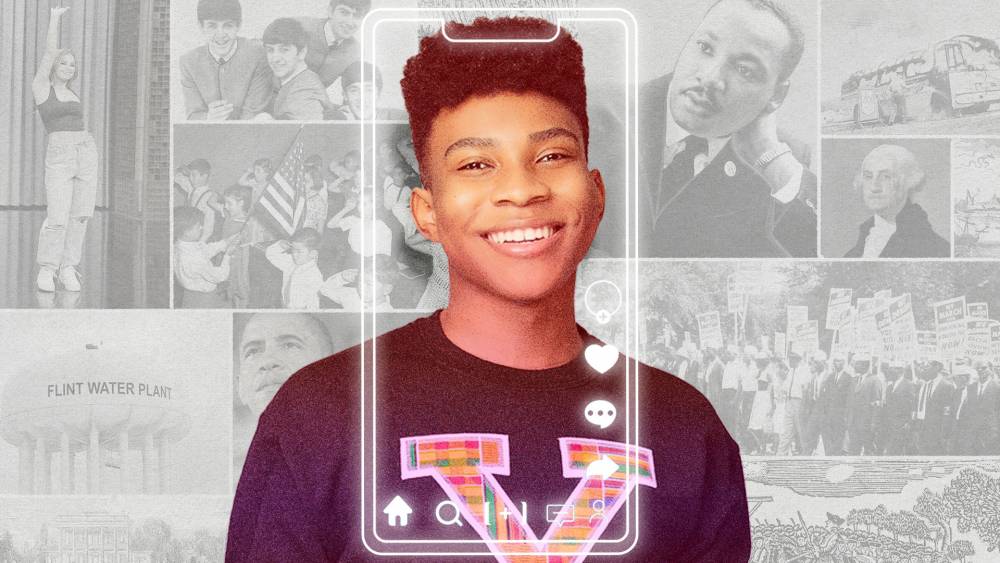
How TikTok Is Assisting African-American Creators In Reclaiming Their History, Identity, And Whitewashed Culture
How TikTok is assisting African-American creators in reclaiming their history, identity, and 'whitewashed' culture
A year after police officers shot and killed George Floyd in Minneapolis, the Black Lives Matter movement continues to shine a light on the impact of police brutality and systemic racism on African Americans. Juneteenth, the June 19 commemoration of the abolition of slavery in the United States, has also gained national prominence and is expected to become a federal holiday this week.
A portion of that attention can be attributed, at least in part, to Black social media creators who use their TikTok and Instagram accounts to share information about current events, racial justice, and overlooked or "whitewashed" Black community history. Kahlil Greene, a Yale history major who studies social change and social movements, is one of those creators. Greene began his TikTok journey in January with video featuring “non-whitewashed” Martin Luther King Jr. quotes. The video has been viewed 1.4 million times.
Greene, who now has over 440,000 followers, has since created videos on a variety of topics, ranging from obscure historical facts to cultural appropriation in music and pop culture. One series, "How everything on this app originated with Black people," delves into TikTok trends such as "swag face" and "sheesh," the origins of which have been obscured by non-Black creators.
"That series was born of annoyance," Greene explained. It was prompted by two events. One such instance occurred when Jimmy Fallon invited TikTok personality Addison Rae to perform several TikTok dances on his show. Viewers were quick to point out that many of the dances were actually created by uncredited Black people. (Fallon later invited those creators to appear on his show in response to backlash.)
The other instance occurred earlier this year during a Saturday Night Live skit titled Gen Z Hospital, in which, as Greene put it, "they were ostensibly mocking Gen Z culture, but what they were actually mocking was Black American culture that Gen Z had co-opted." He then determined how many viral trends originated with Black creators.
Greene explains that he shares his content on TikTok due to the platform's widespread reach.
"You can create a video and it will reach millions of people within a day," he explained. "That reach is not available anywhere else."
Greene says that much of his content is intended to educate Black people about their own history, rather than to reach out to people who may not understand the significance of Black culture and racial justice. Greene has been posting videos on the origins of African-American names since his early days on TikTok. He shared a video explaining the significance of the holiday's flag in the weeks leading up to Juneteenth.
While platforms like TikTok are beneficial for rapidly and widely disseminating information, they are not without drawbacks. Greene claims that several of his videos have been taken down from the site, including segments in which he criticizes other influencers, which he claims are falsely labeled as "harassment and bullying." He has had some success appealing content removals, but has also witnessed others have their entire accounts deleted despite accumulating hundreds of thousands of followers.
"It's disorienting and disparaging," he explained. "There are a lot of people who are frustrated with TikTok."
In Conclusion
A TikTok representative stated in response to these types of removals: "We take great pride and responsibility in the fact that TikTok serves as a platform for people from underrepresented communities to be seen and heard through the stories they share and content they create. We at TikTok are adamant about amplifying the voices of diverse creators."
Greene, however, is one of many Black creators hoping to benefit from a platform that enables him to connect with a diverse range of people, including those seeking information about their own identity and those seeking to educate themselves about the impact of Black communities on art, history, and culture.
Greene discusses the importance of illuminating overlooked Black history in our interview, as well as what he hopes people understand about Juneteenth.
Courses and Certification
Social Media Marketing Course and Certificate
Social Media Course and Certificate
Business Analytics Course and Certificate

